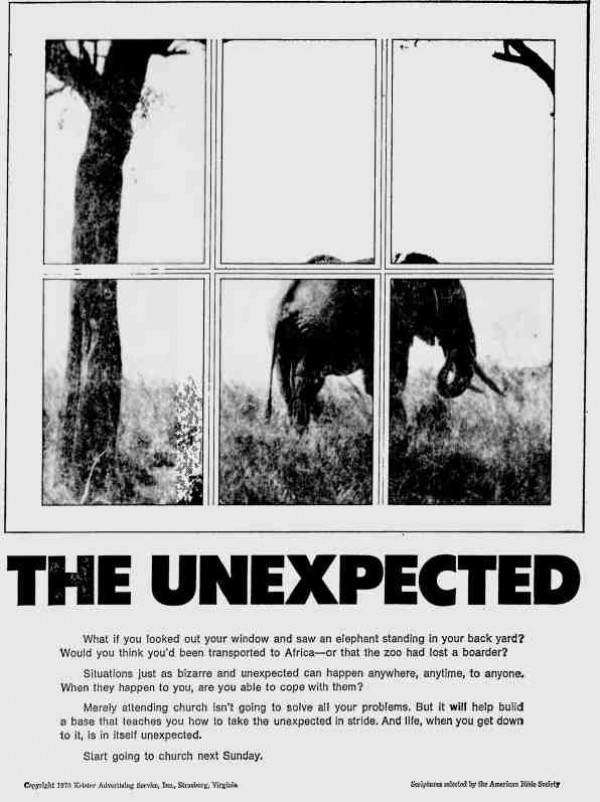1970s
Karlsson-on-the-roof
Karlsson-on-the-Roof from Maripuka85 on Vimeo.
Young boy subject to hallucinations is befriended by drunken fairy godfather. In Russian, but that hardly matters.
The German live-action version is even odder.
Wikipedia entry here.
Posted By: Paul - Fri Nov 28, 2014 -
Comments (2)
Category: Children, Cartoons, 1950s, 1970s, Fictional Monsters, Alcohol, Goofs and Screw-ups
God Manifests as an Elephant

I'm not sure if God sent a real elephant to get us to go to church, or if God Himself manifested as an elephant, or if the whole elephant thing is just a metaphor. But I do know that the next time I see an elephant, I will think of church.
Original ad here.
Posted By: Paul - Fri Nov 21, 2014 -
Comments (4)
Category: Animals, Religion, 1970s
If
Telly Savalas always seemed like an unlikely pop star. And yet, as Wikipedia notes, his version of "If" reached number one on the UK Singles Chart for two weeks in March 1975, and retains the record for being "the shortest title of any song to reach number one in the UK."The parody version:
Posted By: Alex - Sun Nov 09, 2014 -
Comments (5)
Category: Music, World Records, 1970s
Jack van Impe
Wikipedia entry on the man.
Posted By: Paul - Tue Nov 04, 2014 -
Comments (8)
Category: Drugs, Music, Rants, Warnings, Jeremiads, Prophecies and Cassandra-like Figures, Sexuality, Public Indecency, Teenagers, Bohemians, Beatniks, Hippies and Slackers, Conspiracy Theories and Theorists, 1960s, 1970s
Roto-Rooter Commercials
Saving idiot housewives, time-stressed housewives, and horror fans from yucky stinky water troubles for decades.
Posted By: Paul - Mon Nov 03, 2014 -
Comments (4)
Category: Business, Advertising, Products, Domestic, Hygiene, Excrement, 1960s, 1970s
Farewell, Alvin Stardust
RIP.
Posted By: Paul - Sat Oct 25, 2014 -
Comments (2)
Category: Excess, Overkill, Hyperbole and Too Much Is Not Enough, Music, 1970s
Raffaella Carra & The Beatles
Best Beatles cover versions ever! The singer.
Posted By: Paul - Wed Oct 15, 2014 -
Comments (6)
Category: Ineptness, Crudity, Talentlessness, Kitsch, and Bad Art, Music, Pop Art, 1960s, 1970s
Follies of the Madmen #231
Posted By: Paul - Sat Oct 11, 2014 -
Comments (3)
Category: Anthropomorphism, Business, Advertising, Products, Education, 1970s
Vandora, the Supervan
Watch for louche poet Charles Bukowski at 1:22.
You get the theme song in the next clip. Whole film can be streamed at Amazon. IMDB entry here.
Posted By: Paul - Tue Oct 07, 2014 -
Comments (4)
Category: Motor Vehicles, Movies, Pop Art, 1970s
Stayin Alive aka Fight For Your Life
Surely the re-release of this fine film would help clarify and resolve the fraught state of race relations in the USA today.
Posted By: Paul - Sat Oct 04, 2014 -
Comments (2)
Category: Hillbillies, Country Bumpkins, Ruralism and Flyover Country, Ineptness, Crudity, Talentlessness, Kitsch, and Bad Art, Movies, Racism, 1970s

| Who We Are |
|---|
| Alex Boese Alex is the creator and curator of the Museum of Hoaxes. He's also the author of various weird, non-fiction, science-themed books such as Elephants on Acid and Psychedelic Apes. Paul Di Filippo Paul has been paid to put weird ideas into fictional form for over thirty years, in his career as a noted science fiction writer. He has recently begun blogging on many curious topics with three fellow writers at The Inferior 4+1. Contact Us |




